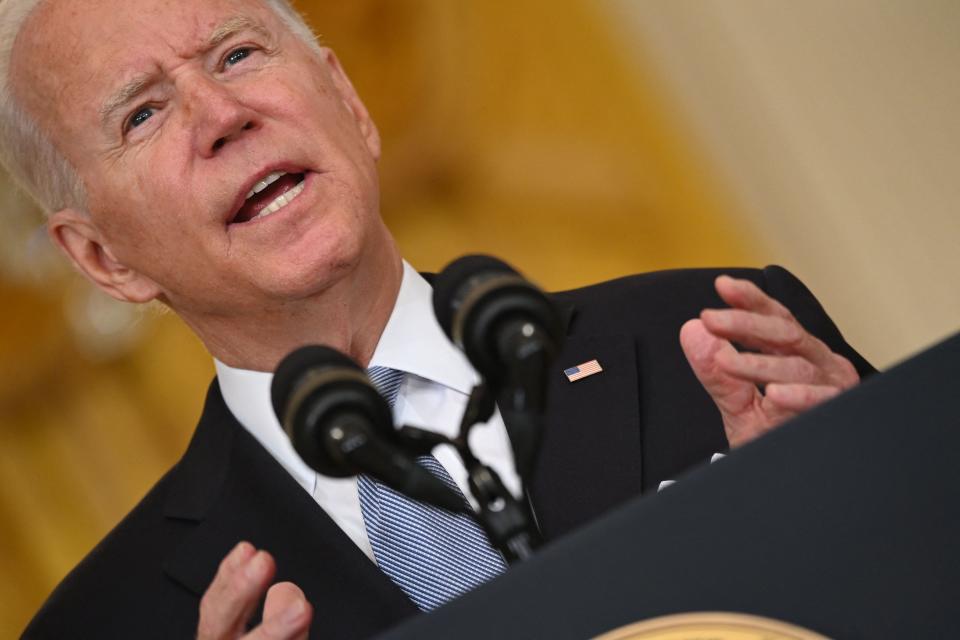'A state of whiplash': Will turmoil in Afghanistan hurt Biden campaign to repair U.S. reputation?
- Oops!Something went wrong.Please try again later.
WASHINGTON – On a sunny June afternoon, Joe Biden concluded the initial phase of his first foreign trip as president by confidently declaring that America’s reputation was on the rebound on the world stage.
“America’s back in the business of leading the world alongside nations who share our most deeply held values,” Biden announced from a seaside resort in England, where he’d just wrapped up three days of meetings with some of the world’s most powerful leaders.
Biden assured reporters at the close of the Group of Seven summit that he’d made progress “in reestablishing American credibility among our closest friends.”
Just two months later, Biden’s own credibility is in question and his campaign to restore America’s reputation abroad is in doubt after the chaotic withdrawal of U.S. troops from Afghanistan and the swift rout of the country’s American-backed government by Taliban insurgents.
In Europe, leaders who eagerly embraced Biden’s presidency after four tumultuous years of Donald Trump have harshly criticized the U.S. pullout from Afghanistan amid harrowing and often violent airport scenes of Afghans desperately trying to flee their homeland.
“Clearly, America wanted out of Afghanistan, but the way Biden did it was like someone wanting to lose weight and then cutting their leg off to do it,” said Harry Kazianis, a senior director at the Center for the National Interest, a think tank founded by Richard Nixon.
“What Biden did was simply not rational, and that will make America’s allies worry for years to come,” Kazianis said.
'Disconnected response':Taliban's Afghanistan takeover deals a harsh blow to Biden's 'America is back' foreign policy promise

'A state of whiplash'
Analysts said it’s too soon to know if the turmoil in Afghanistan will cause long-term consequences for U.S. foreign policy but predicted that, at least initially, it could sow doubts about U.S. reliability in some foreign capitals.
“I think our allies are going to be in a bit of a state of whiplash,” said Emily Harding, a deputy director at the Center for Strategic and International Studies, a Washington-based think tank.
“Biden came in saying America is back, we’re going to reassert leadership in the world, I’m interested in rebuilding alliances,” Harding said. “And then he sent a pretty clear signal with this withdrawal that we are not necessarily going to stick by those alliances when we decide that it’s better to pull out.”
At the White House, Biden said Friday he had not heard any allies question U.S. credibility given the recent turmoil in Afghanistan. In fact, Biden said, he had heard “the exact opposite” in his conversations with foreign leaders.
Biden said he spoke to U.S. allies about Afghanistan during the G-7 summit in England, and “every one of them knew and agreed with the decision I made to jointly end our involvement with Afghanistan.”
Over the past few days, he also has discussed the unfolding events with British Prime Minister Boris Johnson, French President Emmanuel Macron and German Chancellor Angela Merkel. Leaders of G-7 nations also are planning a virtual summit next week to discuss a common strategy and approach in Afghanistan.
'It’s just rubbish': Experts doubt Taliban's promises on women and girls

'These are bitter events'
Before the unfolding crisis in Afghanistan, Biden had good reason to believe that his campaign to restore America’s credibility abroad was producing results.
A Pew Research Center survey released in June showed that his election had led to a dramatic improvement in America’s image in other nations. The survey, which polled people in 16 countries, showed a significant boost in the U.S.’s favorability rating abroad. In 12 nations, a median of 75% of those surveyed expressed confidence in Biden, compared to 17% for Trump last year.
But criticism of Biden and the U.S. among world leaders has been unflinching since Afghanistan’s stunning collapse.
“For those who believed in democracy and freedom, especially for women, these are bitter events," Merkel told members of her party, according to reports in German media.
Norbert Roettgen, the chairman of the German parliament's foreign relations committee, was even more blunt, calling the withdrawal from Afghanistan “a serious and far-reaching miscalculation.”
“This does fundamental damage to the political and moral credibility of the West,” he said.
In the United Kingdom, Tom Tugendhat, a conservative who chairs Parliament's foreign affairs committee, wrote in an op-ed published in the Times of London that the fall of Kabul was a “foreign policy disaster” and complained that it revealed “the nature of U.S. power and our inability to hold a separate line.”
Considering recent events, the U.S. and some of its allies will probably be more reluctant in the future to engage in the kind of transformative, nation-building efforts that were attempted in Afghanistan, said Dan Hamilton, director of the Global Europe Program at the Woodrow Wilson Center in Washington.
“I think the Europeans in particular are going to take a step back from that,” he said. “I think they’ve been stunned by the U.S.’s sudden withdrawal.”
Kazianis predicted that leaders all over the world will now question Biden’s decision-making capabilities, “something no U.S. president should ever have to worry about.”
“America’s allies need to know the Biden administration will have their back in a crisis – especially if that crisis means a challenge from China, Russia, Iran or North Korea,” he said. “Will Biden make a decision based on some sort of shrewd political calculation, like what seemed to be in the case of Afghanistan?”
'Getting worse': Chaos at Kabul airport raises questions about U.S. evacuation effort
See it yourself: Harrowing video shows gunfire, families with crying children at Kabul airport
Adversaries sow doubts about U.S. credibility
U.S. adversaries also are emboldened by what they see as America’s failure in Afghanistan and are using it to cast doubts about America’s credibility.
Nikolai Patrushev, secretary of Russia’s Security Council, said the U.S.’s exit from Afghanistan suggests it would one day abandon its Ukrainian allies in a similarly abrupt fashion, according to media reports.
Laurel Miller, director of the Asia Program at the International Crisis Group, a think tank, dismissed those kinds of remarks as Russian propaganda and said they aren’t likely to change the perception of the U.S in places like Ukraine, which is involved in its own protracted conflict with Russia.
But Kazianis suggested Biden’s miscalculation in Afghanistan could cost him some of the political bandwidth needed to deal with crises in other parts of the world, such as challenges from China, North Korean denuclearization and the long-term threat Iran poses in the Middle East.
“If I am sitting in North Korea, I would think now would be a great time to test an ICBM (missile) or nuclear weapons,” he said. “If I am in China, I would surely think about testing the Biden administration’s will for a crisis over Taiwan. If I am Vladimir Putin, I am surely thinking now could be the time to see if Biden might willing to support Ukraine or in the Baltics.”
Given Biden’s missteps in Afghanistan, America’s enemies are wondering “what other bad decision can we force him into,” Kazianis said.
Harding said the Biden administration’s pullout of troops from Afghanistan probably won’t do long-lasting damage to the U.S. relationship with European countries.
“We have a long-term historic alliance with the countries of Europe,” particularly the United Kingdom, she said. “… When the chips are down, we do tend to have each other's backs.”
Even so, “(Secretary of State) Tony Blinken and the State Department have a lot of work to do,” she said.
Michael Collins covers the White House. Follow him on Twitter @mcollinsNEWS.
Fact check roundup: What’s true and what’s false about the Taliban takeover in Afghanistan
What went wrong in Afghanistan? Perspectives on the 'forever war' from those who saw it up close
This article originally appeared on USA TODAY: Afghanistan: Will chaos hurt Biden pledge to repair U.S. reputation?

